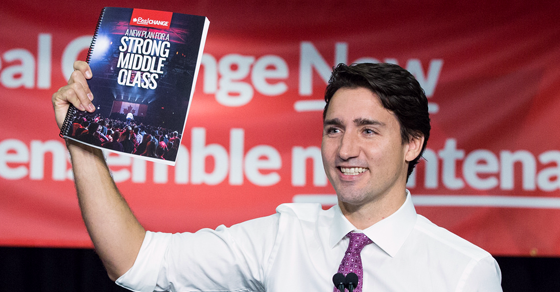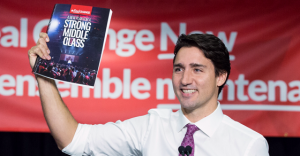
Focus Group to Finance Canada: Trudeau’s Government is Not Doing Enough For The Middle Class
Many Canadians perceive a disconnect between the federal government's middle class rhetoric and its policies.
It turns out words and actions may not be the same thing.
Despite the Trudeau government’s sunny rhetoric about helping the middle class, its very own public opinion research suggests Canadians are having trouble seeing any results.
#LPC’s priority: strengthening those at the heart of our economy— middle class Canadians – who haven’t had a decent raise in 30 years.
— Justin Trudeau (@JustinTrudeau) April 21, 2015
According to newly released public opinion research on Canada’s economy prepared for Finance Canada, bureaucrats concluded there is a “widespread perception” the Trudeau’s government “could do more for the middle class.”
“At least some participants in each group felt that the Government of Canada could be doing more to assist the middle class,” reads the report published internally in February 2017 based on focus groups held across the country.

Focus groups also said they’d like the Trudeau government to do more to help those struggling to join the middle class:
“Some participants felt that the Government of Canada should focus as much (or more) on the ‘lower’ class and try to pull more members of this class up into the ‘middle class’. Specific measures that were identified to help achieve this include establishing a minimum guaranteed income and improving job-training programs (in partnership with the provinces).”
What would most Canadians like to see?
Based on the feedback Finance Canada received, one of the top ideas is having high earners and corporate “pay their ‘fair share’ of taxes:
• Make “wealthy Canadians” and big business pay their fair share through increased corporate and income taxes;
• “Taxing big polluters”;
• “Cracking down on tax havens.”
Here are a few other ideas the focus groups had about how Trudeau’s government can make life more affordable and reduce inequality:
• “Helping create better jobs (i.e. permanent, full-time, well-paying jobs” and “increasing the minimum wage”;
• “Implementing a national daycare program” and “extending paid parental leave”;
• “Increasing the availability of subsidized/affordable housing”;
Given the current state of things, maybe these answers should come as no surprise.
As Postmedia columnist Tom Parkin recently noted, Statistics Canada reports the average Canadian wage in May 2017 was just $25.88 an hour — only 33 cents (or 1.3%) up from May 2016. That’s below the rate of inflation, which stands at 1.7%.
And it gets worse:
“From 2006 to 2015, Canadians in the top two income deciles—the top 20%—increased their share of Canada’s total after-tax income from 44% to 45%. The share of each of the other eight deciles—80% of Canadians—shrank.”
In other words: Canada’s middle class is shrinking, people are feeling the squeeze, and many feel the government isn’t doing enough to reverse the trend.
That reflects what Finance Canada was told too.
Asked to describe their feelings about how the economy is affecting them, respondents were most likely to choose words like “uncertainty,” “insecurity” and “precarious.”
Our journalism is powered by readers like you.
We’re an award-winning non-profit news organization that covers topics like social and economic inequality, big business and labour, and right-wing extremism.
Help us build so we can bring to light stories that don’t get the attention they deserve from Canada’s big corporate media outlets.
Donate





